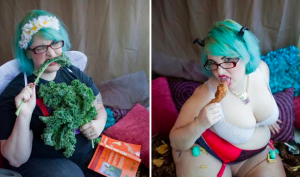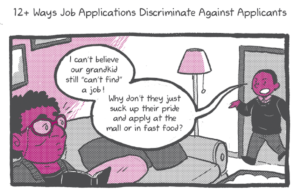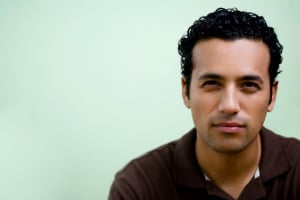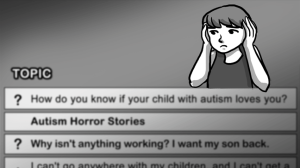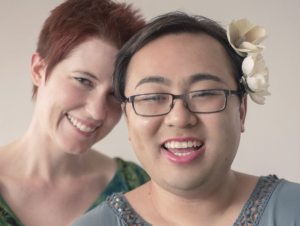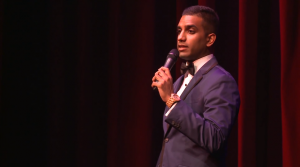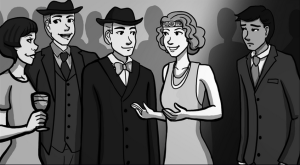Originally published on The Establishment and republished here with their permission.
(Content Note: Discussion of weight, including numbers)
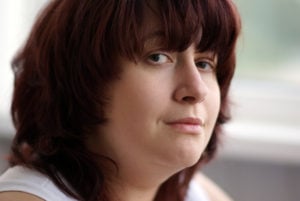
Closeup of a person gazing into the camera with a pensive expression.
The first time it happened, it was my mother.
What perfect betrayal, like burning down the house where I was born. She grew tired in secret of the long, curved line of her belly, pendant in sweatpants and spreading over her lap when she sat. She hated huffing and puffing up the stairs, and she worried she’d become diabetic.
So she underwent a radical form of weight loss surgery that eliminated over half of her gut – and taught me a powerful lesson in how intolerable it was to be like me.
Four kids and a minivan – nobody expected her to bother about her looks anymore. She didn’t tell anyone she was going to do it; she only told me I’d have to look after my younger siblings on the eve of the surgery. She made up her mind and didn’t want their judgments or their approval.
The week before was an orgy of overeating that I recall as a conveyor belt of food. Carbonara thick as oil paint on piles of handmade noodles. Pot roast in flour-thickened gravy, potatoes enough to starve the Irish again, followed by bacon sandwiches that blurted mayonnaise from every side when she bit into them.
Even then, she barely cleared the insurance company’s weight requirement. Her doctor told her to make that last week count. Her best friend joked that she must be going in to get her tits done. She laughed and went under the knife at four-foot-eleven and 285 pounds, nearly as wide as she was tall.
My mother was the first woman I knew who moved out of her own body. She vacated it, bit by bit: the lawn of her hair turning colors and falling out, the front porch of belly and breasts disappearing overnight, the foundation of muscle repossessed and leaving her to scoot down the stairs on her disorientingly bony ass.
She disappeared.
Her hair grew back, but her face changed shape so sharply that friends who she hadn’t seen in a year did not recognize her. She was like any other woman; she loved the attention her new body received and being able to buy clothes in any store she saw.
But what she really wanted was to not be like me anymore.
I went to support groups with her, in the year after the surgery. I didn’t go for the endless stories of these recovering fatties who had traded the feeling of being squeezed by the outside world for being strangled to thinness from within.
I didn’t go for the stories of divorce so utterly rote and predictable that I struggled not to laugh. Men often marry fat women for very specific reasons. Conditions change, and those men split like bananas.
I went along because everyone there had once looked like me – and some of them had very nice clothes. They’d trade with one another, a sixteen for a fourteen, a twelve for an eight. They shrunk before my eyes like icicles in spring. The tables marked 26/24/22 filled up, and there was no one else to take those elastic dresses and 3X yoga pants. I showed up with a roll of garbage bags.
More than once, I inherited someone’s favorite outfit in its entirety, replete with the story of how it made her feel. I would wear that outfit later and remember that she wanted to stop being this so badly that she let someone cut out a large section of her intestines. She had an anchor-shaped scar across her entire abdomen. She vomited every day and shit herself at least once a week, but at least, thank god, it was all worth it because she wasn’t fat anymore.
There were other people I knew who moved out of their bodies, and I could understand why: They knew they had to go. They were being evicted anyway; blown knees and exhausted pancreas pushing them toward desperate measures. Weight loss surgery seemed a fair price if the alternative was death.
But in nearly every case, the alternative was my life.
I used to joke with people that I was my mother’s before picture, in the ubiquitous and devastating tradition of photos taken to reveal dramatic weight loss, the punchline for every ad that sells weight loss to women.
Before, we had shared a silhouette, titanic ass, and olympian hips, a pear-shaped and pendulous swing we rode through the world. After, I had trouble believing we were the same species, let alone iterations of the same bloodline. Long legs and short arms, freckles and the same crooked pinky finger. But disparity of scale suggested two different climates, two long-separated branches on the tree of life.
Before, my mother had dealt with the way people refuse to take fat women seriously. She had endured the infantilization and desexualization, and she was ready to trade it in.
Two days after the surgery, she ignored her doctor’s orders and tried to chug a Coke. I watched her stand over the kitchen sink with brown foam pouring from her nose and mouth, knowing herself chastened not by a paternalistic and fatantagonistic doctor for once, but by the physical reality that her new stomach was the size of a Dixie cup.
A month later, I watched her black out after eating a Starburst; the sugar dumped into her bloodstream so fast that it acted like heroin when it hit her vitals. She traded the agony of perception for daily physical torment. After years of trying and failing at diets that never worked for anyone, she chose the nuclear option. She weighed her options and chose this over living a life like mine.
For me, it’s only the surgery that achieves the sharp sensation of abandonment, rejection, and betrayal. I’ve seen friends through every diet, every justification of denial, misery, and elimination. A friend or a cousin will one day lose the ability to converse about anything but carbs or sugar or whole foods or animal products.
I’ll stop listening and start nodding. I know they’re trying to move out, move away. They cannot bear to be what we are anymore.
The fat people who become obsessed with counting calories and steps, the ones who try to vacate their bodies a little at a time – I don’t worry about them. They’ll never make it. Sooner or later, they all come back.
The ones who follow in my mother’s footsteps are the ones that really leave. They get something cut up and cut out; they install new hardware to stop them from eating the world. They pack it in, and they don’t return. I stay me.
I’ll be polite to my fellow fatties when they fall prey to the pressure; I understand what they’re going through. Thin people talking diets fill me up with liquid murder. I cannot abide their careful warding, hanging up knots of garlic and crossing themselves three times when they see me coming. I will not listen to their terrified superstition or their smug pseudoscience when they tell me again and again what they are willing to go through rather than become like me.
When their talk rolls around to calories and their moral obligation to hate themselves, I typically spread out as wide as I can. I can expand like a jellyfish; it is a particular advantage of the very fat. I conform to the shape of my container like a water balloon. Displaying maximum width, I’ll eat anything I can get my hands on while they talk.
On one notable occasion, I shut down a discussion on the evils of white rice by calmly eating a trick-or-treating sized bag of mini Snickers while nodding my fat head to show I understood.
In outraged weariness of being seen as a cautionary whale, I seek out ways to weaponize my own image. I haunt thin people at the gym as the Ghost of Fatness Yet to Come. It started off as a demoralizing phenomenon; I began by refusing to shrink away from the pained glances and open hostility I receive for having the audacity to live in a fat body without making a constant apology for myself.
My gym in San Francisco is a caricature of bodily obsession. Its ad campaigns are notorious, and lithe trainers cruise the floor like sharks sniffing for blood. There are no other fat people there. An orca among eels, I cast my shadow over their swimming and striving, and they look upon me in naked terror.
I am the reason they get up at 5 AM and wear a monitor that counts their steps. I am the worst thing that can happen.
One after another, the fat people in my life have left me. Not through diet or exercise, not through the much-vaunted “lifestyle change.” They get the surgery and they cross over to the other side. Many of them have been self-accepting, even fat-positive. They came through hell to love themselves and live in their bodies without apologizing.
But they’ve gotten tired of haunting the gym. They get tired of people lecturing and begging. They get tired of men at the bar shouting “man the harpoons.” They get tired of their seatmates on airplanes asking to be moved. They get tired of hearing they were too fat to fuck, or that this dress does not come in that size.
They’ve done the impossible math: one set of humiliations they’re willing to trade for another. They come to agree with our thin friends; this life is the absolute worst fucking thing that can happen to a person.
I made new friends with a fat girl. She is beautiful and smart and holds an enviable position in my community. I tried several times to engage her in the casual sorority of fat girls, to talk brands and clothes and share a little eye roll at the way things are.
She rebuffed me in a kind but cold way, and I didn’t know why. I thought spitefully that she might be one of them, in long recovery from the knife and not yet passing for thin.
Months later, she published her own story of dysphoria in a lyrical cry that broke my heart. I adjusted. I took another step in the direction the conclusion toward which most of my life has been leading me: No matter how much they hurt, the actions of others are entirely for and about themselves. They aim those harpoons at their own hearts.
My mother did not opt for invasive surgery to leave me behind. She did it because was tired of the inescapable fight that is life in a fat body. I am not the victim here. I am only a casualty.
Yet another friend went in for the surgery, early this year. I tried to look at her life without judgment, without centering my own emotions, and figure out why she would choose this. We’re old enough now that vanity itself does not seem like enough.
Maybe she’s lonely and thinks this is the answer. Maybe she wants to travel without being a spectacle and an inconvenience. Maybe she just wants to live in another body before she dies.
In the end, it doesn’t matter. She’s doing the thing that everyone but me will understand. It’s what they would do in her place.
The first day I knew she was home and recovering, I briefly considered having a dozen donuts delivered to her door.
But I didn’t. Because there are worse things a person can be than fat.
***
More from The Establishment:
- When I Said All Trump Supporters Are White Supremacists, I Meant It
- Inside Stanford’s New Victim Blaming Alcohol Policy
[do_widget id=’text-101′]
Meg Elison is the author of The Book of the Unnamed Midwife, a post-apocalyptic feminist speculative novel, Tiptree recommendation, and winner of the 2014 Philip K. Dick Award. The sequel to Midwife will be published in early 2017. Elison is a high school dropout and a graduate of UC Berkeley. She lives in Oakland, throws themed sing-along parties, and appears at Bay Area literary events whenever someone will allow it.
Search our 3000+ articles!
Read our articles about:
Our online racial justice training
Used by hundreds of universities, non-profits, and businesses.
Click to learn more





